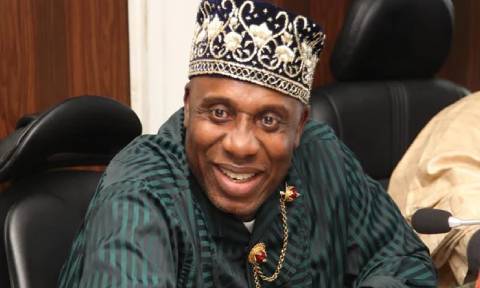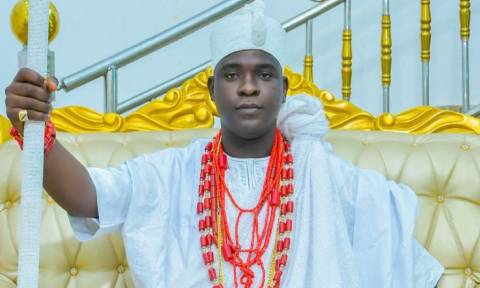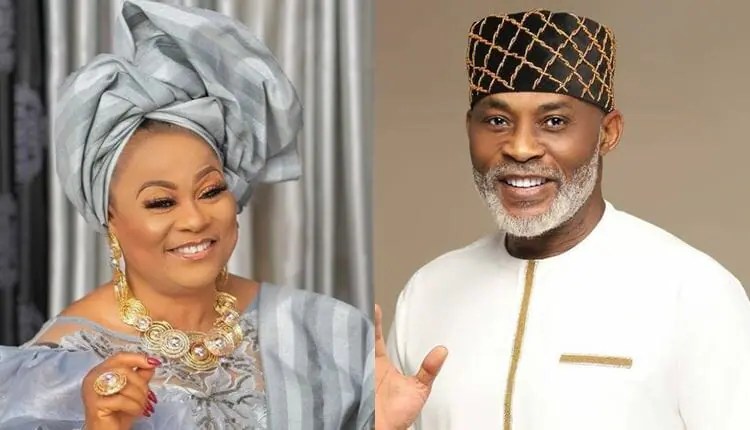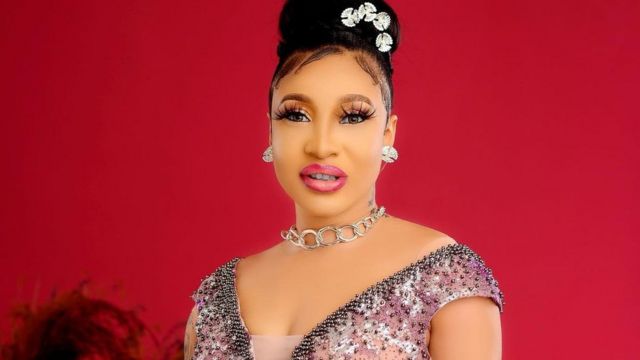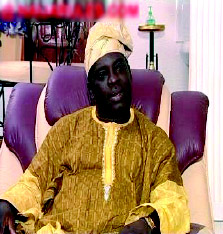
We’ve not seen much of you in Nollywood; why?
I want to believe that Nollywood producers seem to have the kind of people they want in mind. Perhaps, not looking strictly at the type of people like us who are trained in theatre tradition. I really don’t know why they have not invited me to work with them. One will be willing to work with them because if you complain that what they churn out is not really impressive, or doesn’t make much meaning in terms of content, in terms of packaging, then it will not be fair if you distance yourself. Apart from Nollywood films, I have been doing soap operas; which is in a way to move closer to the realm of television production. In essence, that is to say that one is not just trained for stage, but also trained as a theater artiste who embraces stage, film, radio and television.
Why do you think Nollywood producers don’t want to use you?
I just suspect that it’s because we don’t have too many people who have been through the stage practice and tradition. We just have a handful; the major people that feature in Nollywood, a lot of them do not do stage performances anymore because I still do stage plays. Perhaps they’ve drawn that line and said that this man only does stage plays. I really don’t know why. Nobody has told me why. Perhaps, they want to concentrate on those that have decided not to do stage performances anymore. I still do stage plays on a regular basis; I direct, I act on stage, maybe they think I wouldn’t have time.
(cuts in)…Maybe they think you are too educated for their films.
That will be wrong, really. Some people may have that impression but come to think of it, they shouldn’t forget that school book knowledge is different from the real practice. You can apply book knowledge in terms of interpretation; in terms of passing the message and the knowledge that’s inherent in those dramas across to the viewer and the audience. I think most importantly, it is the way and manner in which we are able to interpreter the script that is most important, rather than the theoretical aspect of it because the theory will just help you to look at the depth of the message.
That shouldn’t be the case. They won’t just say that this man is a university lecturer, therefore we won’t call him. Some people may have that impression They may say “okay, how much are we going to be paying him?” I really don’t know. I have not had any talk with them or bothered to find out. But a forum like this will also give one the opportunity to assess what the problems are, and I’m happy to be here because I deal with students who are anxious to know what this problem area is. So when I get back to the classroom, I will tell them my experience.
What do you teach and which school?
I teach in the department of Creative Arts, University of Lagos Theatre section because in the department we have music, visual arts and others. I teach Theatre Arts students.
How do you combine your teaching with acting?
You see, it’s the area of interest that matters. I’m interested in the theatre. So what I do is basically within the fold of the theatre, the music teaching in the theatre, the films I participate in TV or Radio programmes I do are all within the theatre. If I’m not in the classroom I am on location; it’s a process of research. It’s not a bricklayer and vulcaniser job that is a parallel trade. So I am able to combine without stress because it falls within the area of my practice. Even journalism- like we find ourselves doing- is still within the art of communication.
From the lecturer perspective,
when you look at the movies churned out, what goes through your mind? What do you tell your students?
To be honest with you, from the stage, it’s always emphasising the fact that you must train yourself. It’s like a tool that you take to the farm. As a farmer you need to sharpen it very well in order for you to use it. What I tell the students is that your body, your voice are the actors’ tools and must be prepared for passing of the message. The problem that I find in Nollywood is that most of the stories do not have flesh; the content is almost shallow. It’s not well knitted together- there is lack of focus. Sometimes, most of these films are not well put together; the language, the composition of ideas sometimes will misinform you and that’s an unfortunate thing because the viewers out there will judge you by what the writer has described, because that’s what the director will direct. Apart from some of the actors who really do not have the capability to even deal with how to interprete message, the other major problem in the industry is the messages being passed, which also has to do with script writing. So if there is nothing for you to interpreter, you are lost and you find everybody wallowing in the dark. So that’s the problem of Nollywood; it’s not employing the services of people who are trained. And my own joy would be that those who will go to school to learn would also have the opportunity to practice what they’ve learnt, apart from the stage that we introduce them to.
Well some of the people who trained in theatre, particularly stage, sometimes need a bit of orientation before they transmit to telly. It will just be a little training because what I mean is adapting myself as it is different from stage where you do it so loudly, you project your voice to get your expression. But on TV, camera should do all that. There are people you find in Nollywood who have absolutely no focus at all –they just want to be stars. That had been my experience on a daily basis; some people will call and say I want to participate in the movie today. Where are you people now? It’s forbidden, it’s insulting to the profession and annoying. Even your colleagues in other faculties, I’m in the Arts, some are in Sciences, they will say, I want to come to that your location and record with you today. Listen, you may have the talent but I still think that you still need a kind of introduction; you go through those introductory stages for you to perform well. There are people who didn’t study drama in drama schools, the Genevieves, Ramsey Noah, others, but I want to believe that they went through some process of introduction before they began to be featured in movies. You don’t just barge into anything. Those are the issues at stake that people do not want to accept. I appreciate this kind of forum when people say look let’s discuss the issue and I believe that we can sort a lot of things out by coming together to discuss our problem.
When did you decide to be a lecturer?
To be honesty with you, I didn’t decide I was going to be a lecturer. I just found myself working within the university environment. I worked at the University of Ibadan Performing Company, and also in the University of Lagos. I have interacted with a lot of people. Most of the time I’ve spent in this industry have been within the university environment. That did not motivate me to just decide that I was going to do it, but I just found myself as a professional actor, performer who then metamorphosed into teaching. As a professional the university thought that with my knowledge I will be able to impact some information. The university thought okay, now you’ve attained this level in your career we want to retain you so that you can share your knowledge because we believe you have been social with the students. That was how I found myself teaching and that was in the early 90’s.
Being a popular actor, doesn’t this distract your students?
On the contrary it doesn’t distract, but it inspires them. I am a different person when I am in the class; I’m still my agile, very mobile, active and lively person. But when it comes to teaching, particularly when you are standing before students, you don’t want them to take you for granted that this man is a comedian otherwise it will distract them. So you need to concentrate on why you are there, you want them to appreciate that this is a learning process and in doing that you have to take it seriously and take them through the rudiments. The first time the students meet with me they seemed to be like, ‘this man oh…. we are happy to be here,’ but when I start you find there is absolute silence, Though, when I chip in one or two jokes they relax. I also found out that they are ready to take instruction because I don’t compromise that discipline.
You are also a comedian?
You’ve never heard about that.
I have been in comedy from the very start.
Do you agree that the advent of Nollywood crashed the theatre?
I want to say that a lot of people would prefer to sit at the comfort of their homes and watch movies and this has affected the number of people that may want to watch live theatre. However, there are still people who would want to see live theatre, but because of problems of insecurity; problems of bad road, lack of infrastructure, they can’t. Those days we use to visit Jebaco Cinema to watch films and people were leaving their houses to watch live performances. Chief Hubert Ogunde, Kola Ogunmola and others used to do theatre performances and people were leaving their houses to watch live performances then and you could walk in the middle of night, 12am, 1am, but that cannot happen again.
The main problem of theatre is insecurity and that’s why you see people staying within the comfort of their homes and watching African Magic and other movie channels because it’s more convenient. However, people are still doing theatre performances. They just restricted so much to the campuses, rather than theatre houses like you used to have in the National Theatre every month. Again, people are not putting down their money to support theatre, that’s why it will still go back to the universities where students would have to showcase their talents in the course of their studies and perform on stage for the university community to come and see. That way you really do not need so many sponsors; the students themselves can put their heads together and do it, the universities can give them some form of funding to showcase their talents. But out there, all the organisations, even private individuals would like to recoup their money instantly.
Which are you more passionate about?
Theatre. Just give me the stage because people started seeing me on telly recently. I started the one-man show with ‘The Molue’ which was heavily published before the coming of the younger comedians, but I found out that journalists do not have enough information as regards the evolution of comedy. It’s also good to trace the history and give credit to those who started it.
Why is the downturn in soap operas?
I will say the people before now took their time to work on scripts, productions, had serious meetings with serious-minded people, they were particular about the contents. But now, you could within few days shoot a movie, a soap opera so that advertisers can come in. Now the name of the game is ‘I want it fast.’
How did you start?
I was doing a solo performance right from secondary school. Then we used to have school debate, that was late 70s because I graduated in 1979, those were the days we were participating in school debate and cultural shows. That was when I started doing solo performances; from there I went to UNILAG in the early 80s to apply for Law. The result was not forthcoming, rather I was advised to study drama. Even in UNILAG, they had no drama department, what they had was like a cultural centre and I registered with the centre. I was working with them and they advised me to go to University of Ibadan and register in the department of Theatre Arts. I worked in Ibadan with the University of Ibadan Performing Company with people like Clarion Chukwura, Uncle Sam Loco and so many veterans then at NTA Ibadan. We had a very strong tradition of theatre practice. I was moving from Ibadan to Ife , to UNIBEN. I was doing my solo performance at University of Ife, anchoring all the events, doing Stand- up comedy in the early 80s. You had posters everywhere. If you check your library you still see stories that were written about me. You find about ‘The Molue’ which was the major Stand -up comedy that I know of then, I don’t know of any other one. I started here at Night Shift Coliseum. By then they had not refurbished this place the way it is now. So it was at that point that I started to develop the interest and passion and I then went to study in Ibadan . I studied in England at the Royal Count Theatre, where Professor Wole Soyinka also had his tutelage. From that point I have been to other places-Italy , UK and others. Right now, I am doing a research in the area of theatre practise in the UK .
How many productions so far?
I can’t remember. It may be more than 100 for theatre and 200 for TV.
Why that signature, I mean your cap?
It’s a unique identity. I like to do things differently. It’s not craving for attention but the fact that I don’t like to join the regular things. Sometimes it’s nauseating when I turn the radio or TV, they keep repeating the same thing, recycling ideas. I would have introduced all kinds of programmes to TV and radio stations but they will be telling you, this is too different, too intellectual but they are coming back to it now. For instance, look, the idea I gave to TV stations, I said, old musicians like Ebenezer Obey, Sunny Ade, Oliver de Coque (before he died) and other musicians of the old, bring them to the studio and play their works let people ask them what motivated them to compose the lyrics, and they will be able to explain and younger ones will learn from their experiences. But people were saying it’s too intellectual.
How old are you?
I am 50.



